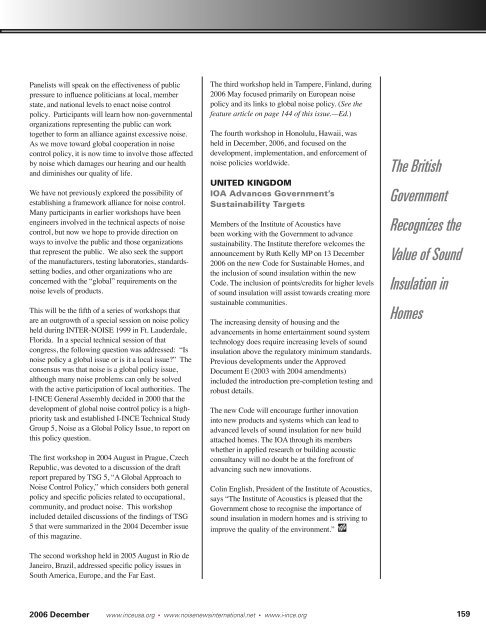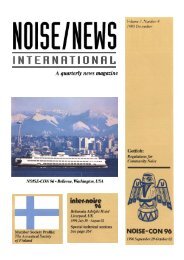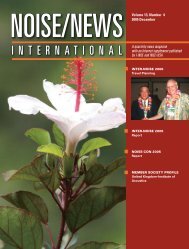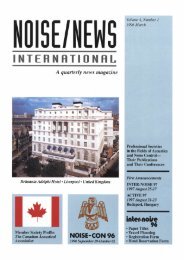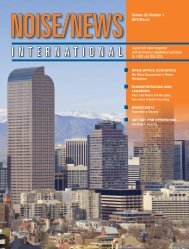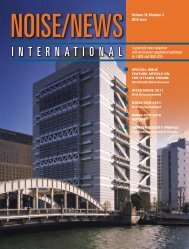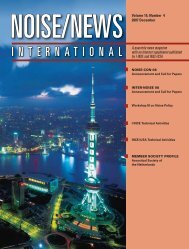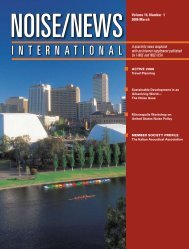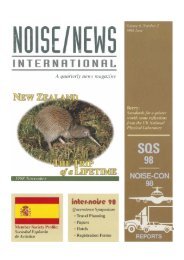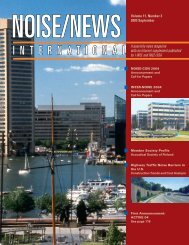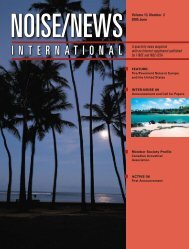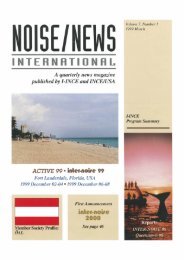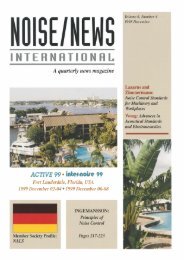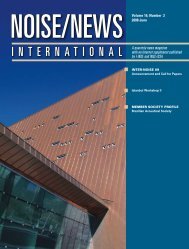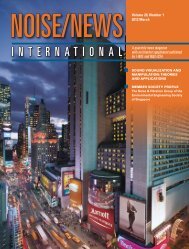Volume 14, Number 4, December, 2006 - Noise News International
Volume 14, Number 4, December, 2006 - Noise News International
Volume 14, Number 4, December, 2006 - Noise News International
You also want an ePaper? Increase the reach of your titles
YUMPU automatically turns print PDFs into web optimized ePapers that Google loves.
Panelists will speak on the effectiveness of public<br />
pressure to influence politicians at local, member<br />
state, and national levels to enact noise control<br />
policy. Participants will learn how non-governmental<br />
organizations representing the public can work<br />
together to form an alliance against excessive noise.<br />
As we move toward global cooperation in noise<br />
control policy, it is now time to involve those affected<br />
by noise which damages our hearing and our health<br />
and diminishes our quality of life.<br />
We have not previously explored the possibility of<br />
establishing a framework alliance for noise control.<br />
Many participants in earlier workshops have been<br />
engineers involved in the technical aspects of noise<br />
control, but now we hope to provide direction on<br />
ways to involve the public and those organizations<br />
that represent the public. We also seek the support<br />
of the manufacturers, testing laboratories, standardssetting<br />
bodies, and other organizations who are<br />
concerned with the “global” requirements on the<br />
noise levels of products.<br />
This will be the fifth of a series of workshops that<br />
are an outgrowth of a special session on noise policy<br />
held during INTER-NOISE 1999 in Ft. Lauderdale,<br />
Florida. In a special technical session of that<br />
congress, the following question was addressed: “Is<br />
noise policy a global issue or is it a local issue?” The<br />
consensus was that noise is a global policy issue,<br />
although many noise problems can only be solved<br />
with the active participation of local authorities. The<br />
I-INCE General Assembly decided in 2000 that the<br />
development of global noise control policy is a highpriority<br />
task and established I-INCE Technical Study<br />
Group 5, <strong>Noise</strong> as a Global Policy Issue, to report on<br />
this policy question.<br />
The first workshop in 2004 August in Prague, Czech<br />
Republic, was devoted to a discussion of the draft<br />
report prepared by TSG 5, “A Global Approach to<br />
<strong>Noise</strong> Control Policy,” which considers both general<br />
policy and specific policies related to occupational,<br />
community, and product noise. This workshop<br />
included detailed discussions of the findings of TSG<br />
5 that were summarized in the 2004 <strong>December</strong> issue<br />
of this magazine.<br />
The second workshop held in 2005 August in Rio de<br />
Janeiro, Brazil, addressed specific policy issues in<br />
South America, Europe, and the Far East.<br />
The third workshop held in Tampere, Finland, during<br />
<strong>2006</strong> May focused primarily on European noise<br />
policy and its links to global noise policy. (See the<br />
feature article on page <strong>14</strong>4 of this issue.—Ed.)<br />
The fourth workshop in Honolulu, Hawaii, was<br />
held in <strong>December</strong>, <strong>2006</strong>, and focused on the<br />
development, implementation, and enforcement of<br />
noise policies worldwide.<br />
UNITED KINGDOM<br />
IOA Advances Government’s<br />
Sustainability Targets<br />
Members of the Institute of Acoustics have<br />
been working with the Government to advance<br />
sustainability. The Institute therefore welcomes the<br />
announcement by Ruth Kelly MP on 13 <strong>December</strong><br />
<strong>2006</strong> on the new Code for Sustainable Homes, and<br />
the inclusion of sound insulation within the new<br />
Code. The inclusion of points/credits for higher levels<br />
of sound insulation will assist towards creating more<br />
sustainable communities.<br />
The increasing density of housing and the<br />
advancements in home entertainment sound system<br />
technology does require increasing levels of sound<br />
insulation above the regulatory minimum standards.<br />
Previous developments under the Approved<br />
Document E (2003 with 2004 amendments)<br />
included the introduction pre-completion testing and<br />
robust details.<br />
The new Code will encourage further innovation<br />
into new products and systems which can lead to<br />
advanced levels of sound insulation for new build<br />
attached homes. The IOA through its members<br />
whether in applied research or building acoustic<br />
consultancy will no doubt be at the forefront of<br />
advancing such new innovations.<br />
Colin English, President of the Institute of Acoustics,<br />
says “The Institute of Acoustics is pleased that the<br />
Government chose to recognise the importance of<br />
sound insulation in modern homes and is striving to<br />
improve the quality of the environment.”<br />
NNI<br />
The British<br />
Government<br />
Recognizes the<br />
Value of Sound<br />
Insulation in<br />
Homes<br />
<strong>2006</strong> <strong>December</strong> www.inceusa.org • www.noisenewsinternational.net • www.i-ince.org<br />
159


